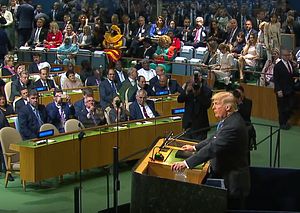On September 19, in his first speech to the United Nations, U.S. President Donald Trump threatened to “totally destroy North Korea” and taunted North Korea’s supreme leader Kim Jong-un as a “Rocket Man.” The speech was made a day after Trump had a phone call with Chinese President Xi Jinping in which both leaders promised to handle the Korean crisis “through vigorous enforcement of United Nations Security Council resolutions.” Undoubtedly, from the Chinese perspective, Trump’s striking remarks have made the North Korea issue worse.
Trump’s remark on North Korea was the most sensational part of his speech in the UN. Media worldwide, including in China, focused attention almost exclusively on Trump’s North Korea comments.
“If the righteous many do not confront the wicked few, then evil will triumph,” Trump said, “Rocket Man is on a suicide mission for himself and for his regime.”
It was not the first time that Trump used the nickname “Rocket Man” to address Kim. The North Korean leader has overseen several missile launches in the past few months. On September 17, Trump derided Kim as a “Rocket Man” in a tweet.
In his UN speech, Trump went on to say, “The United States has great strength and patience, but if it is forced to defend itself or its allies, we will have no choice but to totally destroy North Korea.”
The North Korean ambassador to the UN left the hall before Trump’s speech started, saving himself from hearing the insult and threat directly.
Nevertheless, Trump’s speech will likely reach North Korean ears, from Kim to the common people. Such bombast from the American president would seem to justify North Korea’s concerns, morphing the recent missile launches from outright provocations to reasonable self-defense measures.
This is a familiar gambit to Beijing: Mao Zedong made highly isolated China into a nuclear power under the threat of the “American Imperialism.” For that reason, Beijing fears pushing Pyongyang further into isolation, knowing that a functioning nuclear-weapons state is the result.
Perhaps in an attempt to prevent Trump from saying what he ultimately said, Xi held a phone call with his American counterpart on September 18. The two leaders discussed the North Korean crisis an, according to the White House readout of the call, committed to maximizing pressure on North Korea via the United Nations.
Trump seemed to only catch the part about “maximizing pressure” and completely missed the part about doing so “through United Nations.” His selective understanding will irritate Beijing, as China’s foreign ministry has long opposed any kind of military threat towards North Korea.
China’s most recent warning against issuing military threats was on September 19, before Trump gave his speech. Chinese foreign ministry Spokesperson Lu Kang said at the regular press conference:
The fact how the Korean Peninsula issue has evolved to where it is today has proven that the military threats, either in terms of rhetoric or action, have failed to help resolve the issue. On the contrary, they have in most cases heightened the tension on the Korean Peninsula and made it even more difficult or complex to settle the Korean Peninsula nuclear issue and achieve the denuclearization of the Korean Peninsula. We hope all the relevant parties can return to the spirit and principle of all the DPRK-related Security Council resolutions, including the just adopted Resolution 2375 and implement the UN Security Council resolutions in a comprehensive and accurate manner.
Neither Xi’s call nor the Chinese foreign ministry’s warnings have influenced Trump. To make matters worse, Trump repeated his campaign slogan of “America first” in the UN hall. He said, “As president of the United States, I will always put America first.”
His nationalist stance together with his unpredictable character make Trump less reliable in China’s eyes.
A Reuters report quoted Aaron David Miller, a former Middle East negotiator for both Democratic and Republican administrations as saying,“Neither of the biggest problems, North Korea and Iran, can be solved by an America First, Lone Ranger policy.”
Beijing thinks so too.

































